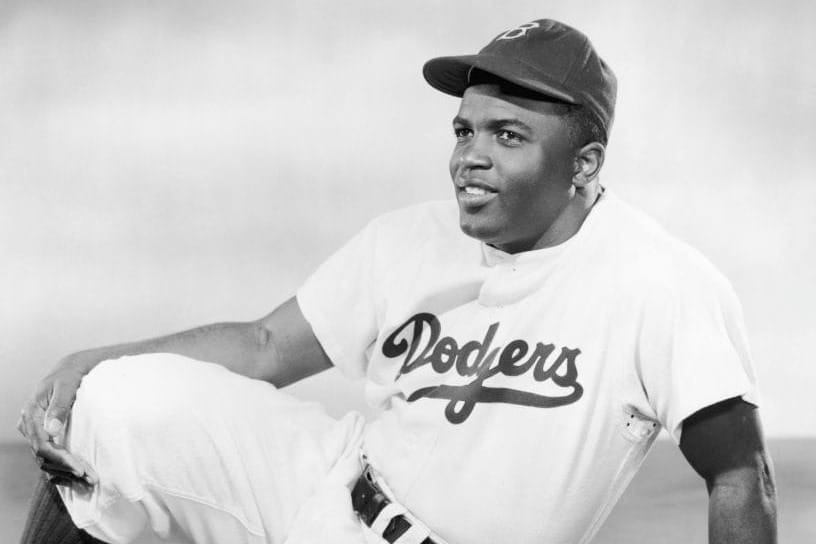I was traveling with my then 14-year-old daughter when I spotted former major league baseball player Darryl Strawberry in the airport. Never much a fanboy, I nevertheless walked up to Mr. Strawberry, who had a pair of Beats headphones on his ears, just to shake his hand. I was at pains afterwards to explain to my daughter why I was so excited to meet Mr. Strawberry. Like most of her generation of African Americans, baseball is not a “thing.” That Strawberry is still so recognizable more than 20 years after his retirement speaks to an era in which baseball really was America’s pastime, and possessed stars who transcended the sport. Strawberry, like his former teammate Dwight Gooden, and their contemporaries Ozzie Smith, Barry Bonds and Ken Griffey, Jr. were the very faces of the game. That the most recognizable baseball players would be African American is unfathomable now, as it was before April 14, 1947.
I was six-years old when Jackie Robinson made his last public appearance at the 1972 World Series with the Cincinnati Reds and the Oakland A’s. It was the first Series that I remember watching, and I watched much of it with my late dad. I suspect my dad, as I had with my daughter, tried to explain to me the significance of Robinson. The legend not only broke baseball’s color barrier himself, but in his brief remarks that day, he implored Major League Baseball to do more for integration by hiring its first Black manager. But I was too enthralled with Reggie Jackson’s irrepressible swag and the way Joe Morgan hitched his elbow when at bat (I would mimic him in the mirror).
I do remember though when Robinson, only a few weeks after that appearance, succumbed to complications from heart disease and diabetes at the young age of 53. I was still too young to fully process Robinson’s impact. Nevertheless, the reverence that my father held for him has stayed with me my entire life.
My father and I watched many baseball games, including those first games that Strawberry played for the New York Mets during his rookie season in 1983. We watched the first games of Gooden when he joined the team the next year, and I called my dad from college when the Mets won the World Series a few years later. We didn’t talk much about Robinson in those days, though as a student of African American history and culture, Robinson’s legacy became complicated as I fell under the sway of thinkers like Malcolm X, Sonia Sanchez, Amiri Baraka, and Stokely Carmichael. Robinson was not a “thing” for the young scholar in the making.
That changed months later when Los Angeles Dodgers general manager, on the 40th anniversary of Robinson’s breaking of the so-called “color-line,” attempted to respond to the dearth of Black managers by suggesting that perhaps African Americans were ill-equipped to manage, using the now-infamous comparison of why there were not many Black swimmers (they lacked buoyancy, he said).
A decade later in 1997, as the ranks of Black managers had increased, including Cito Gaston, who won back-to-back World Series managing the Toronto Blue Jays in 1992 and 1993, there was another groundbreaking Black athlete on the horizon. A young Eldrick “Tiger” Woods won his first Masters tournament days before the nation celebrated the 50th anniversary Robinson’s breakthrough. In 2024 there are fewer Black ball players on the diamond — at every level — and there is no one who even remotely looks like Tiger Woods in the ranks of the golf elite.
I go back now to photos of Robinson, on that day in Cincinnati in the autumn of 1972, his hair gray, he is barely ambulatory, a shadow of the man who dared challenge the idea of racial segregation, and who would steal home, for the thrill of it. Robinson would no doubt be disappointed that young African Americans have seemingly given up a game, that he gave so much to, but he would also applaud the past success of Woods and would have gotten a good laugh at Campanis’ comments given the gold medal in swimming that Simone Manual won in the 2016 Summer Olympics.
For this father and scholar, who is a few years older than Robinson was when he died, Jackie Robinson is indeed a “thing.” More than 50 years later I realize why Robinson mattered so much to my dad, because he was a symbol of the possibilities that were ahead, not for him, but his young son. For that I thank my dad, as I thank Jackie Robinson, on behalf of so many sons and daughters whose parents dreamed what was possible, because Robinson did.
This post originally appeared on Medium and is edited and republished with author's permission. Read more of Mark Anthony Neal's work on Medium.
